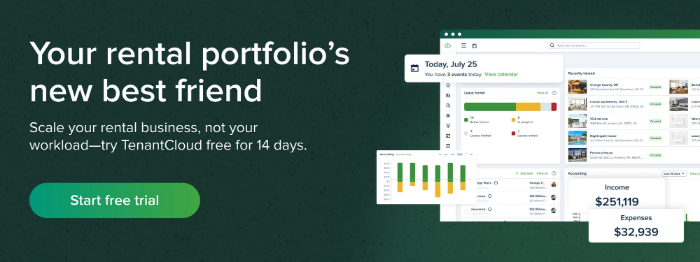Whether you use traditional or digital methods to run tenant credit checks as a landlord, you likely have your hands full. In today's world, you may be wondering are tenant credit checks really necessary? When you run several tenant screening reports a week and have few issues with tenants, it may seem excessive. However, as a landlord, credit checks are an essential tool to have in your tool belt.
While it's normal to want to move towards easier and more practical processes to speed things up, it's important to maintain thorough tenant screenings to protect your investments. After all, maintaining a rental business that is safe and effective means ensuring the rent is paid by responsible tenants, right?
Sure, you’d love to assume that all tenants will respect their lease agreements and maintain great rent payment habits. But landlords who skip credit checks face a 60-80% higher risk of eviction compared to those who screen properly.
So, how do you run a tenant credit check in a way that is easy and quick? With a thorough screening process—and a property management software. Not only will this combo help keep you organized, but it protects your investment with built-in features such as comprehensive tenant screening, credit checks and income verification.
Here's how:
TL;DR
Tenant credit checks are one of the most effective ways to protect your rental business. They reveal whether applicants have a reliable payment history, stable financial habits, or red flags like late payments or high debt. While a credit check costs around $25–$45, skipping it could cost thousands in eviction losses.
This guide walks landlords through why credit checks matter, how to run them legally, what scores to look for, and how to handle applicants with poor or no credit. It also highlights TenantCloud’s partnership with Snappt—an AI-powered tool that detects fake income documents—making the screening process more secure and accurate for every property owner.
What are Tenant Credit Checks? Why Do They Matter?
Even if you haven’t run a credit check on a potential tenant, someone has likely run a credit check on you in the past. Buying a home, applying for a job, and renting your first home often come with required credit checks.
A tenant credit check is more than just a number. It creates a financial snapshot that helps predict rental payment behavior.
What is Credit History?
Your credit history is a timeline of how long–and how well–you have managed your credit accounts.
The credit history report can reveal some interesting patterns that may correlate with tenant reliability: research shows that applicants with credit scores above 650 have a 15% lower default rate compared to those below 600.
There are several factors that will shape a tenant's credit profile:
- Payment history (35% of score): This shows whether the tenant pays their bills (such as rent) on time
- Credit utilization (30% of score): This indicates any financial stress levels
- Length of credit history (15% of score): Credit history shows habits of long-term financial management
- Credit mix and new credit (20% combined): Reflects financial sophistication (how they are using their credit strategically over time)
A credit check gives an overview of an applicant's financial situation. But remember, it's only a single piece of a much larger picture.
Related: What Is Tenant Screening and Why Do You Need It?
Credit checks matter because they reveal whether or not you can depend on a tenant to pay when rent’s due.
Rental payment issues are the top concern for 84 percent of landlords. And in competitive rental markets like San Francisco or Boston, where average renter credit scores exceed 715, a credit check helps identify tenants who can meet their financial obligations in high-cost areas.
For instance, TenantCloud offers comprehensive tenant screening. Plus, our new partnership with Snappt adds document-based income verification that catches fraudulent applications – which is a growing problem affecting nearly 10% of rental applications nationwide.
Credit Reports: What You Need to Know
As you run credit checks on tenants, you’ll find that most individuals have multiple credit reports. Credit bureaus, or consumer reporting agencies, gather and maintain financial data from creditors, such as credit card companies.
Many landlords don't realize that the three major bureaus often have different information, so knowing how to screen a tenant and run credit checks from multiple bureaus is important.
When you check a tenant's credit, look beyond the score itself. There are some other key red flags that you’ll want to consider as you move through the tenant screening process:
- Recent bankruptcies (especially Chapter 7)
- Multiple accounts in collections
- Pattern of late payments across multiple accounts
- Excessive credit inquiries (may indicate financial desperation)
- High debt-to-income ratio (over 50%)
While these may not require immediate rejection, they give color to whether or not a tenant may be trustworthy, which can have lasting ramifications on your property.
How to Run a Credit Check on a Tenant: The Complete Process
So, if a credit check report is so important, how do you run a credit check on a tenant? There are steps you can take to learn more about a particular tenant, but there are legalities you must follow to avoid being penalized.
1. Get Authorization to Run a Credit Check on a Tenant
Before you check a tenant's credit, you must obtain written authorization. This is non-negotiable, as it’s federal law under the Fair Credit Reporting Act (FCRA).
You should send a potential tenant a consent form, and it should clearly explain what screening involves and how the information will be used. This is key – because violating this requirement can result in fines up to $100-$1,000 per violation.
2. Choose a Credit Check Service or Bureau
Once you have approval from the tenant, you’ll want to choose which credit bureaus to use for the credit check. Most will opt for leading credit agencies – such as Experian, Equifax, or TransUnion – or opt for online tenant screening services.
Before you run a credit check, you’ll need to create an account with your chosen provider and provide documentation verifying your identity as a landlord or property manager.
3. Submit Tenant Information
Once you’re ready, you’ll need to give the agency the necessary information to run the report.
This typically includes the tenant’s full legal name, Social Security Number (or ITIN), address history, and other required details.
Some services ask the tenant to complete an online screening and authorize the process themselves, which may result in a soft credit inquiry that does not affect their score.
4. Review the Credit Check Report
Once you receive the credit report, it’s time to review and approve! You’ll want to assess the report for a few key indicators: credit score, payment history, defaults, collections, bankruptcies, liens, judgments, eviction records, and recent credit inquiries.
But don’t take the credit report as the only approval criterion. Take it into account with other considerations, such as proof of income, rental history, employment verification, and references, before making a decision.
What are Good Credit Scores for Tenants?
The definition of a "good" credit score varies dramatically by location. In 2025, here's what landlords typically require:
Credit Score Range | Category | Implications for Tenants | Typical Approval Odds |
800–850 | Exceptional | Highest reliability, best rental terms | Nearly certain |
740–799 | Very Good | Low risk, favorable leases, lower deposits | Very high |
670–739 | Good | National rental average, solid payment history | High |
650–669 | Acceptable/Fair | Common threshold, may need references or a higher deposit | Moderate |
580–649 | Fair | Riskier, often requires a cosigner, and a larger deposit | Low to moderate |
300–579 | Poor | High risk, application likely denied | Rarely approved |
What If a Tenant Has a Low Credit Score?
A low credit score isn’t a deal breaker, but it can often disqualify an applicant from renting a property. Like all decisions, you’ll need to take into account the credit score as well as other considerations before making a final decision.
Some locations, such as Kansas City, prohibit automation rejections based on credit scores. Landlords must now consider the complete financial picture, including income stability and rental history.
It may sound tricky, but landlords may find it profitable to be flexible with their credit score requirements.
Consider this possible scenario: an applicant with a 640 score but stable employment for 5+ years and excellent landlord references might be less risky than someone with a 700 score but frequent job changes. You will want to make sure your screening criteria reflects these nuances.
Unexpected Tenant Credit Check Issues You May Encounter
Once you start running tenant credit checks and screenings, you’ll find that there are all types of scenarios you never expected.
The Credit Check Doesn’t Tell The Whole Story
For instance, suppose an applicant has an outstanding medical bill or is recovering after a period of unemployment.
In that case, they might have negative items on their credit report or a lower tenant credit score. Despite this, they may still be a great candidate for your vacant rental property. This is why credit checks are only one part of a much larger tenant screening process.
The Tenant Has No Credit History
Sometimes, an individual will have no credit history! Here are the four most common reasons why:
- They're young and haven't built a credit history – common in college towns
- They're wary of banks and haven’t built up a relationship with a financial institution
- They've recently moved to the country
- They're giving you false or incorrect information
This is where document-based verification becomes key. TenantCloud's partnership with Snappt provides AI-powered analysis of pay stubs and bank statements, detecting altered documents that traditional credit checks might miss.
You Need More Than a Credit Check
If the tenant's credit check comes up empty, what should you do?
Rather than immediately rejecting them, try other ways to get information. Running an employment verification and criminal background checks can help you verify the information they provided in their application.
If you run a tenant credit check and they have a low score, be sure to review the credit report carefully. Under the new 2025 regulations in several states, you must provide individualized assessments rather than blanket rejections based on credit scores alone.
Steps to Take Before You Reject a Tenant
Say you’ve run the reports, and things don’t look promising. There are still steps you can take to make sure that you’ve done your due diligence:
- Find out what steps, if any, they're taking to improve their credit.
- Look at their credit report to see their previous rental history.
- Call their previous landlord (with the applicant's permission).
- Consult a legal professional to make sure you're not violating any laws by rejecting the applicant.
You never know if an individual might be coming out of a bad experience or rebuilding their lives - and your property may be a great place for them to land.
By taking all the steps you can throughout the screening process, you can make sure that you are finding the best tenant for your property.
Legal Compliance and Best Practices for Tenant Credit Checks
As with many parts of property management, running credit checks requires strict legal compliance. Here's what you must do to make sure you stay above the law:
- Obtain written consent before running any checks
- Provide adverse action notices if denying based on credit
- Include the credit bureau's contact information
- Inform applicants of their right to dispute information
- Apply criteria consistently to all applicants
- Maintain secure storage of all credit reports
Remember: Some jurisdictions now prohibit using credit scores for Section 8 or subsidized housing applicants. Cities like Oakland and Philadelphia have additional restrictions on how credit information can factor into rental decisions.
Build A Better Tenant Credit Check Process with TenantCloud (Now Partnering with Snappt!)
Screening a prospective tenant's credit history is one of the most important parts of property ownership. The last thing you want is to end up with a tenant who fails to meet your expectations or damages your property.
But here’s the catch: while traditional credit checks reveal past financial behavior, they can't detect one growing threat: document fraud. This growing problem is why TenantCloud is partnering with Snappt – the leading AI-powered fraud detection platform for rental applications.
Snappt's document-based verification analyzes documents such as pay stubs and bank statements, and using advanced AI, can quickly detect alterations and fabricated documents that might pass human review.
The new partnership integration works directly within TenantCloud's existing screening workflow. When you order a Full Check Report with Snappt verification ($65), the system:
- Analyzes uploaded income documents for authenticity
- Flags any detected alterations or inconsistencies
- Provides a clear fraud risk assessment score
- Delivers results in an easy-to-read PDF report within hours
For landlords managing properties where monthly rent exceeds $2,000, this additional $20 investment in verification can prevent losses that average $8,000 per fraudulent tenant.
The best part? Legitimate applicants benefit too. Those with genuine documents get faster approvals, while the transparent process ensures everyone is evaluated fairly based on verified financial information.
Get Started Today
Remember that tenant screening is no longer just about credit scores—it's about comprehensive risk assessment. That’s why you need tools and operations in place that help speed up the process without risking non-compliance.
TenantCloud's comprehensive credit check solutions, now enhanced with Snappt's AI-powered fraud detection, give you the complete picture you need to make confident rental decisions. With the right combination of features and tools, you can create a smooth tenant screening and credit check process that takes the guesswork out of finding the best new tenants.
Want to learn more? Start your free 14-day trial today and see why thousands of landlords trust TenantCloud for their screening needs.
FAQs About Tenant Credit Checks
What credit score do most landlords require?
In 2025, the national average minimum credit score for rentals falls between 620 and 700, but this will depend on your market.
For instance, luxury properties in cities like San Francisco typically require 700+, while suburban and rural markets often accept 620-650.
For most locations, 650 is the sweet spot that opens doors to most rental properties nationwide.
Can I rent with bad credit?
Yes, but you'll need to be strategic in how you apply for homes. Your options include offering a larger security deposit (often 1.5-2x the standard amount) or providing a co-signer with good credit. You can also show proof of savings equal to 3-6 months' rent, or look for "second chance" rental programs. Some landlords accept detailed explanation letters about credit issues, especially for medical debt or pandemic-related problems.
How much does a tenant credit check cost?
Credit check costs typically range from $25-$45 per applicant. Full screening packages, including criminal background and eviction checks, run $35-$65.
While this might seem like an added expense, remember that one bad tenant can cost you $3,500-10,000 in eviction costs alone; the ROI on proper screening is massive!
What’s the most cost-effective way for small landlords to access enterprise-level tenant screening?
Small landlords can access premium tenant screening bundles by choosing per-price reports rather than per-unit or subscription. This approach provides access to comprehensive screening data without requiring long-term contracts or high monthly fees. It’s a scalable way to get professional applicant screening while keeping costs predictable.
Which tenant screening platforms identify red flags and advanced tenant risk beyond basic credit scores?
There are several advanced screening platforms that go beyond credit scores. Platforms like TenantCloud offer criminal and eviction scores, risk summaries, behavioral indicators, and overall insights. These tools help landlords evaluate patterns such as payment history, prior housing issues, or inconsistencies across reports, providing a clearer picture of applicant risk than a credit score alone.
What questions should I ask besides running a credit check?
Credit checks never tell the whole story. Here are some more questions to ask potential renters:
- Why are you moving?
- Have you ever broken a lease?
- Can you provide references from your last two landlords?
- What's your monthly income?
- Have you ever been evicted?
- Do you have pets?
- When do you need to move in?
These questions, combined with credit checks, give you the complete picture needed for informed decisions.







